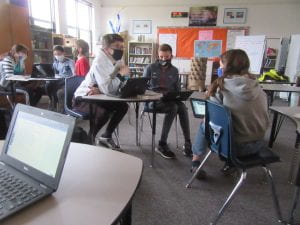A specific job in our classroom economy is that of student blogger. Our student blogger, ES, was busy last week. Below in the 1st blog post, completed by ES (the only parts that have been changed are that of the names and the photos have been cropped so as to remove names and faces).
Thursday, December 3rd 2020
Today in class
Science
We had our science experiment work day, although some of us have not started our experiments, we thought of ideas for our projects, and how to execute them.
Social studies
SR presented our news and weather, we also did 10 push-ups, and a 2 minute plank, and introduced our jobs, and responsibilities.
Math
In math we focused on operations with fractions, we did not get to an investigation, so we had it as homework.
Jewish Studies
In jewish studies we did our textbook projects, that’s it.
ELA
In ELA we broke up into small groups, and discussed our thoughts on “the giver” That we had done as homework the night before.
Student of the day
 LI
LI
LI always manages to put a smile on your face, and make you feel better. Also she is the better player.
Best background
DY
DY chose a clever, and funny background, with “the office” confessional.
Screen shot
The best moments caught on camera.
 When SR was sleeping in class (many weeks ago).
When SR was sleeping in class (many weeks ago).
Interview
This week I interviewed MB on his experience on virtual learning, and our social studies project.
Q: How has your experience with virtual school been?
A: Virtual school has been nice
Q: How has our project in social studies been?
A: I love our project in social studies
Q: If you could change one thing about virtual school what would it be?
A: I would love to see my freinds





